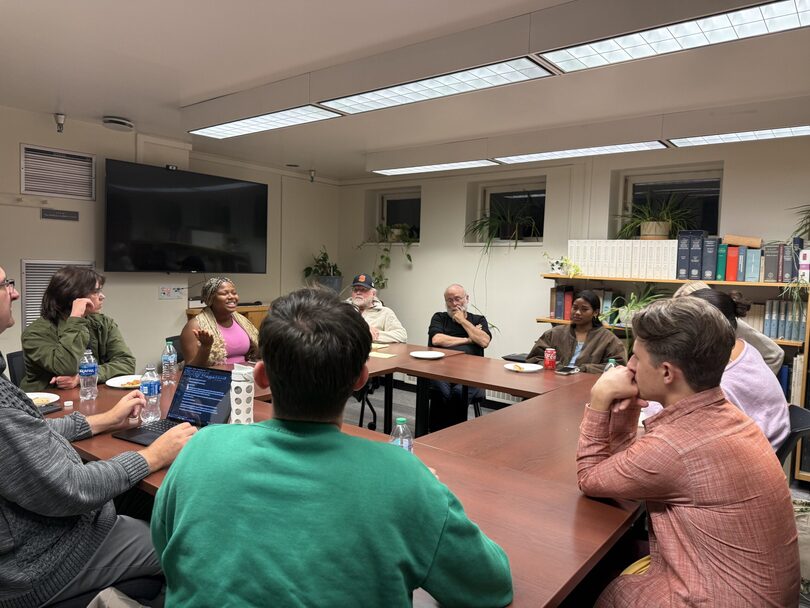Students, faculty praise Department of Religion’s size, hope for admission reinstatement

Students and faculty in the Department of Religion advocated for the religion major at a Thursday informational session, hoping to regain its admission status. Students said the major's size is an advantage of the program, not a downside. Isabel Meléndez-Rivera | Staff Writer
Get the latest Syracuse news delivered right to your inbox.
Subscribe to our newsletter here.
Students and faculty members in Syracuse University’s Department of Religion voiced concern over SU’s admissions pause to the religion major during a Thursday night informational session, saying its smaller size is an advantage and strength of the program.
The religion program, which is among 20 majors with pauses to its admissions, held the listening in preparation for a meeting with College of Arts and Sciences administrators. Gareth Fisher, religion department chair, gathered students and faculty within the major to advocate for the program.
The major currently has 10 enrolled students, Fisher said, including double majors.
“My main goal with the meeting tonight was to get ideas from students about what we could tell the administration at the meeting tomorrow about our strategy for increasing our number of majors,” Fisher said.
Students pointed to the positive experiences the program’s smaller size offers as one thing faculty should highlight during the meeting. Nathan Spoto, a junior psychology major, said being part of a smaller program helps him connect more with faculty and students.
“It is great because I’ve had professors who know me by name, and can understand when I’m struggling to understand whatever topic we’re talking about in class, just off of the way I look,” Sapoto said.
Student attendees said they declared a major or minor in religion after being approached by a professor in the department. They suggested that faculty could increase religion program enrollment by collaborating with campus organizations, tabling, creating posters and boosting social media presence.
Religion Professor and Director of Undergraduate Studies Philip Arnold and Professor Zachary Braiterman told attendees they recently eliminated requirements within the major and made it as “bare-bones” as possible to expand enrollment.
“This is the first semester that the new major has gone into effect, so that’s one of the arguments that we’re trying to make, is that we haven’t really been given a chance to try it out yet,” Fisher said.
Chloe Genick, a senior communication and rhetorical studies major, has taken several courses in the program. She said she feels supported by the religion department’s more personal, “boutique” experience compared to larger departments.
“It’s bordering therapy for some students, and it’s like a welfare check to the point of being able to take these classes and be in a community that shares the same intent,” she said.
Other attendees, including Jolie Bellerand, a sophomore religion minor, agreed that interest in religious studies remains strong at SU.
“I don’t think that there should be a doubt in any person’s mind that religion is still something that attracts people to any university,” Bellerand said. “It would be a shame if, because of this whole thing, fewer classes were offered.”
In the past, faculty tried organizing open houses and a club, yet saw limited success, Fisher said. Now, they’re seeking help to improve the department’s social media and already have students excited about assisting.
Carol Hornbeck, a junior religion major, proposed drafting emails to administrators, advocating the importance and value of religious studies.
“I want them to know I am upset,” Hornbeck said.
She said the university would make a “huge mistake” by abandoning fields like religion, which she said help students develop critical thinking skills.
Fisher said the university hasn’t established a way to collect student feedback on program pauses, so events like Thursday’s session were organized in response. Faculty in the department decided to organize it after a similar session from the African American Studies program last week.
Both African American and religious studies are interdisciplinary fields, Fisher said, like many of the programs with admissions pauses. Braiterman said humanities studies as a whole are being negatively impacted on a national level.
“There’s plummeting enrollments in humanities across the country, and that affects smaller humanities programs disproportionately, so religion is a smaller program,” Braiterman said.
Religion faculty at the session told students they would act on some of their suggestions, but even if enrollment sees a boost, the program’s continuation is not ensured.
“It’s not a guarantee that if we get 20 majors, we’re going to be taken off the pauses,” Fisher said. “We want that to happen, and we were proposing that to the administration, but that’s not certain and they haven’t promised to accept that in any way.”
Low enrollment numbers aren’t enough of a reason to eliminate the program, Fisher said, and he hopes to see improved communication between the department and university administration
“I understand where they’re coming from, but I also hope that they can understand where we’re coming from and what we offer to this university, and how important that is,” Fisher said.





